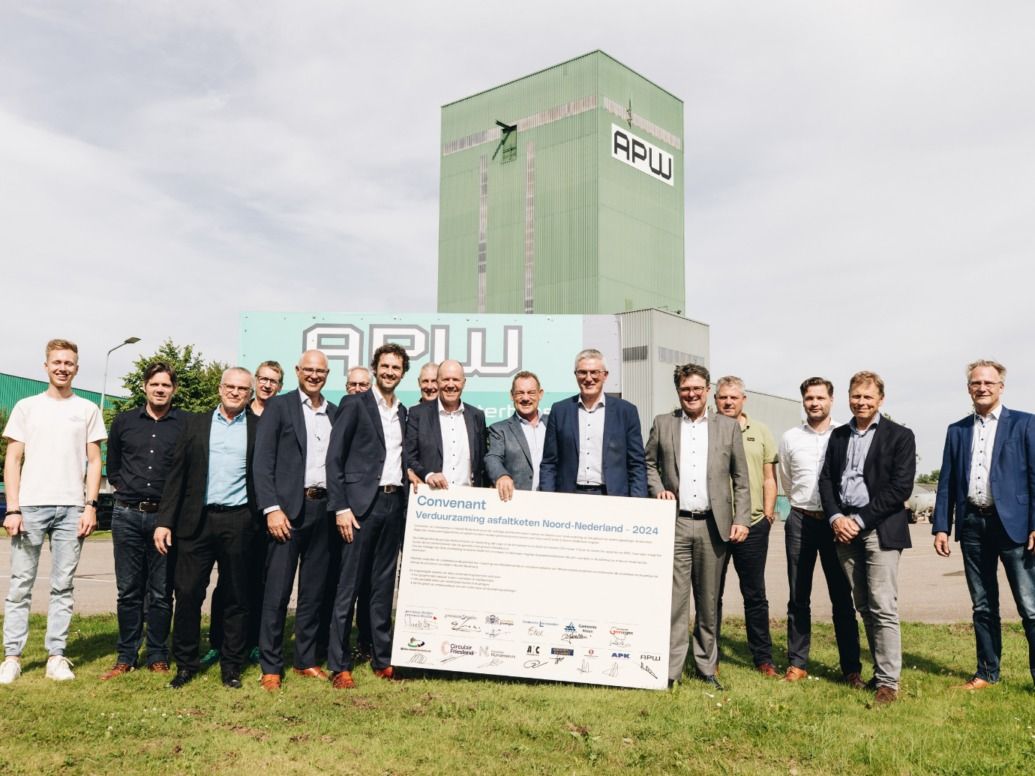
Added: Apr 28, 2025
Last edited: May 14, 2025
Government bodies, industry associations, and market players in the three northern provinces of the Netherlands are jointly committing to more sustainable asphalt. They signed a regional agreement (convenant) outlining their shared ambition to reduce the number of asphalt types, use more sustainable materials, lower production temperatures, increase asphalt reuse, and make the region’s three asphalt plants more sustainable.
Sustainability in Infrastructure
Provincial and municipal governments are looking to reduce their environmental impact. According to Tobias Strating, head of the Energy and Environment knowledge cluster at engineering and infrastructure firm Roelofs Groep, sustainable road construction offers great opportunities: “Infrastructure projects are major investments for public authorities and have a large environmental footprint due to raw material use and CO₂ emissions. If governments want to reduce their footprint, infrastructure—particularly asphalt production—offers significant potential.”
Sander Wubbolts, regional manager of Bouwend Nederland Noord (Dutch Construction Association North), explains: “The agreement states that we aim to reduce the number of different asphalt types in the Northern Netherlands. This leads to cost savings in production. We also want to use more sustainable variants. The most environmentally harmful type, clear bitumen, will be completely phased out. We aim to use more biobased binders, lower production temperatures, and increase the reuse of existing asphalt.”


A National Example: The North as a Sustainability Front-runner
Harm Beerda of the Circular Friesland Association, the initiator of the agreement, sees this collaboration as a pioneering effort. The agreement has been signed by the provinces of Fryslân, Groningen, and Drenthe, and by the cities of Assen, Leeuwarden, and Groningen. Other signatories include Bouwend Nederland, NL Ingenieurs (Dutch Engineering Association), Circular Friesland, the regional asphalt plants in Staphorst, Kootstertille, and Westerbroek, and private companies such as Schagen and Roelofs Groep.
Beerda highlights the national recognition of this initiative: “A representative from the Dutch Ministry of Infrastructure and Water Management attended the signing in Groningen. Nowhere else in the country have all players in the asphalt chain come this far in making sustainability agreements. Our initiative was even cited as a best practice in a letter to Parliament.”
He also stresses that this is more than just symbolic: “Sometimes a covenant results in nothing more than good intentions, but the signings in all three provinces showed that local leaders are truly committed—and willing to accept some financial risk to make progress.”
Currently, only the three provincial capital cities have formally signed the agreement. According to Tobias Strating, this is a deliberate strategy: “Leeuwarden, Groningen, and Assen have more capacity and expertise than surrounding municipalities. The idea is that this agreement will gradually spread across the region. Other municipalities can join the efforts and benefit from the knowledge and experience gained in the capitals. For example, Heerenveen has already expressed interest to Leeuwarden.”


Long-term security for the sector
For the three asphalt plants involved, the agreement provides long-term security. “The plants in Westerbroek, Staphorst, and Kootstertille are all due for modernization,” says Wubbolts. “This agreement provides crucial support to make those investments happen. They now have certainty that there is a market for sustainable production and more environmentally friendly asphalt types.”
The agreement also gives infrastructure companies more predictability: “These shared commitments help the sector move toward meeting sustainability goals—and away from the race to the lowest price at the cost of the environment.”
According to Beerda, the cost concern is also relative: “European regulations increasingly require us to translate environmental impact into financial terms. In the long run, sustainable asphalt will be the cheaper option. It’s great to see that both public and private sectors are already working on this together in such a collaborative way.”


The goal of this collaboration is to seize all available opportunities to make asphalt applications more sustainable. Regional climate ambitions and asphalt innovations are being aligned, and knowledge on sustainable asphalt is being shared across the region. The signatories endorse the national Climate Act target of at least 55% CO₂ reduction by 2030 compared to 1990 levels. The initiative also contributes to the goals of the national Raw Materials Agreement on circularity.
Key objectives include:
- Capturing sustainability opportunities in the asphalt sector
- Contributing to climate-neutral and circular infrastructure projects
- Streamlining asphalt procurement and production across the region
Core added value of the collaboration:
- A unified approach between governments and private sector players
- Periodic sharing of knowledge and experience
- Acting as ambassadors of a joint sustainability strategy

